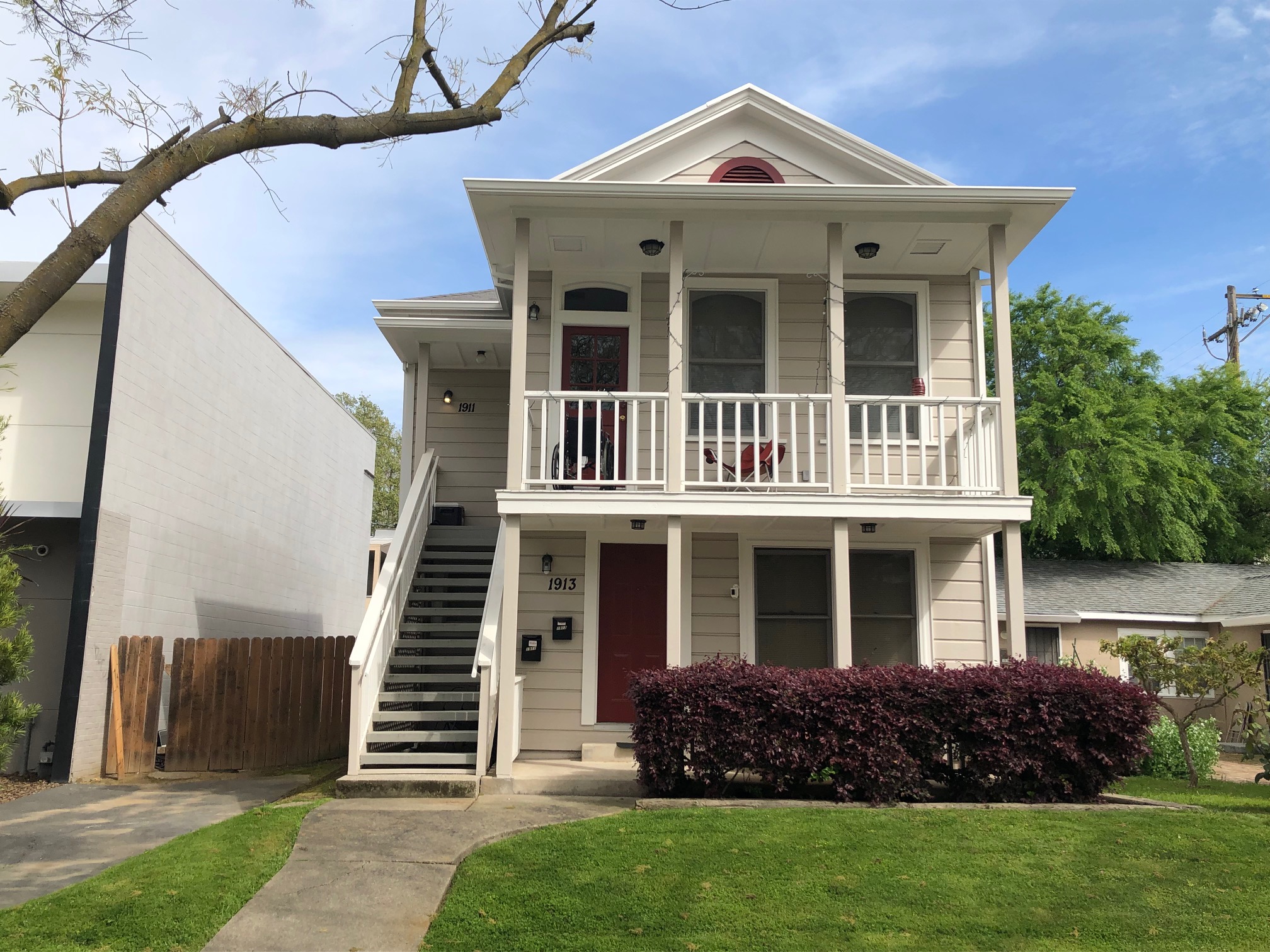Daily Business Report-April 18, 2019
Image courtesy of the Salk Institute for Biological Studies
Salk Institute Initiative to receive
$35 million+ to fight climate change
The Salk Institute’s Harnessing Plants Initiative to combat climate change using plants, led by Professor Joanne Chory, executive director of the Harnessing Plants Initiative, will receive funding of more than $35 million from over 10 individuals and organizations through The Audacious Project, a highly competitive program housed at TED, the nonprofit devoted to ideas worth spreading. The collective commitments represent one of the largest gifts to a single project in the institute’s history.
The Harnessing Plants Initiative Leadership Team—which includes Salk faculty Wolfgang Busch, Joseph Ecker, Julie Law and Joseph Noel—aims to use a combination of cutting-edge technologies to turbocharge plants’ ability to capture and store larger amounts of carbon from the atmosphere in their roots and keep it buried in the ground for hundreds of years.
“Plants have evolved over time to be an ideal vehicle for carbon capture and storage,” said Professor Joanne Chory, executive director of the Harnessing Plants Initiative. “If we can optimize plants’ natural ability to capture and store carbon we can develop plants that not only have the potential to reduce carbon dioxide in the atmosphere (negative emissions) but that can also help enrich soils and increase crop yields.”
____________________
UK government investigating Illumina’s
proposed acquisition of Pacific Biosciences
GenomeWeb
The UK government’s Competition and Markets Authority (CMA) said that it has launched an investigation into Illumina’s planned acquisition of Pacific Biosciences.
Illumina announced last November that it plans to acquire PacBio for approximately $1.2 billion in cash. In January, the company reiterated that it expects the acquisition to close mid-year.
CMA is currently considering whether the acquisition “will result in the creation of a relevant merger situation under the merger provisions of the Enterprise Act 2002” and whether it will likely result “in a substantial lessening of competition within any market or markets in the United Kingdom for goods or services.” Until May 3, stakeholders are invited to send the agency comments on competition issues.
CMA, a non-ministerial department of the UK government, is in charge of promoting competition and reducing anti-competitive activities in the UK. Among other actions, it investigates mergers that could restrict competition.
____________________

Astronomers discover third
planet in Kepler-47 system
SDSU News Team
Astronomers have discovered a third planet in the Kepler-47 system, securing the system’s title as the most interesting of the binary-star worlds. Using data from NASA’s Kepler space telescope, a team of researchers, led by astronomers at San Diego State University, detected the new Neptune-to-Saturn-size planet orbiting between two previously known planets.
With its three planets orbiting two suns, Kepler-47 is the only known multi-planet circumbinary system. Circumbinary planets are those that orbit two stars.
The planets in the Kepler-47 system were detected via the “transit method.” If the orbital plane of the planet is aligned edge-on as seen from Earth, the planet can pass in front of the host stars, leading to a measurable decrease in the observed brightness. The new planet, dubbed Kepler-47d, was not detected earlier due to weak transit signals.
As is common with circumbinary planets, the alignment of the orbital planes of the planets change with time. In this case, the middle planet’s orbit has become more aligned, leading to a stronger transit signal. The transit depth went from undetectable at the beginning of the Kepler Mission to the deepest of the three planets over the span of just four years.
The SDSU researchers were surprised by both the size and location of the new planet. Kepler-47d is the largest of the three planets in the Kepler-47 system.
Read more…
____________________
May 7 is property tax deadline for all
business, aircraft and vessel owners
All business, aircraft, and vessel owners are reminded that this year’s deadline to file their property statement without a penalty is May 7, 2019. All filings must be received or postmarked on or before May 7 to avoid a 10 percent late filing penalty. In January, approximately 65,000 statements and notices were mailed out to business, aircraft, and vessel owners. Included are over 57,000 business accounts that were deemed eligible to file electronically. The e-file process is simple, accurate, and a secure way to pay your property taxes.
____________________
City invites public
to parks visioning workshops
The city of San Diego will host three open house workshops for the public to review the progress that has been made in creating a new Parks Master Plan, a three-year comprehensive planning and outreach project to help create the parks and recreation system of the future. This is the first Parks Master Plan for the city in more than 50 years.
“The workshops are opportunities for residents to learn more about the Parks Master Plan and contribute ideas to help decide future parks and programs to meet the recreational needs of our citizens,” said Mike Hansen, the city planning director.
The three workshops are:
Tuesday, April 23, from 4 to 8 p.m., Balboa Park Club Ballroom, 2150 Pan American Road W., San Diego, 92101.
Saturday, April 27, from 10 a.m. to 1 p.m., San Ysidro Civic Center, 212 W. Park Ave., San Diego, 92173.
Saturday, May 4, from 10 a.m. to 1 p.m., Carmel Valley Recreation Center, 3777 Townsgate Drive, San Diego, 92130.
Those who cannot attend one of the workshops will still be able to learn more about the Parks Master Plan and participate in an online workshop tool, available in multiple languages, starting April 22 at: cityofsandiegoparksplan.com.
____________________

Murphy Development starts construction
on spec building in San Diego Business Park
Murphy Development Company has started construction on the final building at The Campus at San Diego Business Park, a 137,000-square-foot speculative building on seven acres. Building 3, a concrete tilt-up located at 2065 Sanyo Ave., will feature a 32-foot minimum clear height, 6,000 amps of 277/480 volt power, manufacturing sewer and water capacity, ESFR sprinklers, concrete truck courts, wide column spacing and high dock door ratios designed for distribution users.
Murphy’s development team for Building 3 includes Pacific Cornerstone Architects and Lusardi Construction as the general contractor. Construction is set to be completed in the fourth quarter of 2019.
____________________

Cornerstone Office Center sold for $9.5 million
A private investor has acquired Cornerstone Office Center from MIG Real Estate for $9.5 million. Cornerstone Office Center, which was 100 percent leased at the time of the sale, is a three-story, 43,210-square-foot Class B office building, anchored by technology companies including Motive Interactive, Rohm Semiconductor and Microchip Technologies. It is located at 6020 Cornerstone Court West in Sorrento Mesa.
Voit Real Estate Services represented the buyer. CBRE represented the seller.
____________________

Next-generation MTS trolley cars
will begin service on Saturday

As the next generation of Trolley cars gears up to begin service on the UC San Diego Blue Line this Saturday, officials with the San Diego Metropolitan Transit System (MTS) unveiled to the public the first vehicle of the new Trolley series as part of a ‘Trolley Open House’ on Wednesday. The new Trolley cars will enter service as part of the 5000 vehicles series, representing the third generation of modern, low-floor vehicles, which have been in operation on MTS’ light rail network since 2005.
For the past seven months, MTS has been steadily receiving new Siemens S700 Trolley cars as part of an order of 45 vehicles placed in 2016. The first Trolley car was delivered last August, in the iconic red paint scheme of the San Diego Trolley, with the remaining vehicles expected to be delivered over the next 2 years.
The 45 new S700 light rail vehicles (LRVs) have the same low-floor characteristics as newer models in MTS’ current fleet, but feature a redesigned middle section to improve passenger flow and provide door-to-door accessibility for riders in wheelchairs or other mobility devices. To facilitate cleaning and maintenance, train seats will be upholstered standard in vinyl rather than the cloth used in previous models. Additional features include improved interior sightlines for added security and relocated operational equipment to facilitate easier access by maintenance technicians.
____________________
Personnel Announcements
Negin Banaei joins Union Bank
as Private Wealth Advisor

Union Bank announced that Negin Banaei has joined as a Private Wealth Advisor serving the San Diego market. Banaei will report to Stephen Sherline, managing director, Private Wealth Management, and will be based out of Union Bank’s Downtown San Diego office.
In her role, Banaei will partner with a team of Union Bank strategists and experts to deliver customized banking, credit, and wealth management solutions to affluent and high net worth individuals and families.
Banaei joins the bank with more than 14 years of experience in the wealth management space in the areas of banking, credit and custom lending; retirement and investment advisory solutions; and estate and wealth transition planning. In addition, she has specialized in insurance, liquidity management and business succession planning.
Most recently, Banaei served as a senior Private Client advisor, vice president for Bank of the West Wealth Management where she was responsible for providing wealth management strategies for the bank’s high net worth clients in the San Diego market. She previously held the positions of vice president and premier relationship advisor with HSBC Securities as well as private banker for Wells Fargo.
____________________
Robert Peck joins
Noonan Lance Boyer & Banach

Noonan Lance Boyer & Banach LLP announced the addition of Robert K. Peck to its legal team. As the firm’s newest associate attorney, he will handle general civil litigation, complex business disputes and professional liability litigation and employment cases.
Peck previously worked at a Newport Beach litigation firm where he represented clients in the apparel, printing, software and retail automotive industries. Throughout his career, he has been instrumental in achieving a number of high profile results for clients, including a $500,000 jury verdict in favor of a seller of holistic healing equipment and a $1.5 million arbitration award for a software developer.
A member of the American Bar Association and the San Diego County Bar Association, he received a bachelor’s degree in political science from the University of California, Santa Barbara and earned his J.D. from the University of San Diego School of Law, where he graduated “cum laude” and was made a member of the Order of Coif.
____________________

Lawmakers and landlords:
More than a quarter of California legislators are both
By Matt Levin and Elizabeth Castillo | CALmatters
In a quiet neighborhood on the outskirts of south Sacramento, the property looks like any other on the block: a single-story house that could use a new paint job, a large front yard that could use a little tidying, a chain-link fence circumferencing the lot.
The tenants inside have no complaints—they have a good relationship with the property manager, and broken things get fixed on time. But like millions of renters in this increasingly costly state, they say that if their landlord raised the rent, they couldn’t afford to stay.
State law doesn’t do much to protect against such a scenario. Because they rent a single-family home, they wouldn’t benefit from rent control even if Sacramento votes to adopt it next year. They could be evicted without being given a specific reason why.
The tenants—who declined to be identified for this story—were unaware their monthly rent checks were going to the wife of a man with significant sway over whether those state laws will change this year: state Assembly Speaker Anthony Rendon. A Democrat from Los Angeles, Rendon and his wife collect rental income from four properties: three single-family homes in Sacramento and a condominium in downtown L.A.
Rendon declined to be interviewed for this story. A spokesman wrote via email that Rendon “is aware of the cost pressure that many tenants face and has voted for a host of tenants’ protection bills that have been before him in the Assembly.” He emphasized that the Speaker’s wife owned three of the rental properties well before marrying Rendon.
He’s not the only lawmaker to double as a landlord. A CALmatters analysis of state-required financial disclosure documents reveals that at least 30 lawmakers—more than 25% of the Legislature—own one or more properties that generate income from tenants. Six sit on one of the Legislature’s housing committees. Many are renting out multiple homes, receiving at a minimum tens of thousands of dollars a year in rent checks.
While comprehensive data on legislator living arrangements is hard to obtain, CALmatters could locate only one lawmaker who did not own a home: Assemblyman Todd Gloria, Democrat from San Diego. (Email us if we missed one, and check out our updated “California legislators: Just like you?” interactive below this story to find out if the lawmakers representing you are landlords.)
Over the past three years, bills to expand rent control, require “just cause” evictions and provide other tenant protections have failed to make it out of the Capitol. Tenant advocacy groups say that while the influence of the landlord and developer lobby is their biggest obstacle in convincing lawmakers to support their legislation, the fact that so many lawmakers are landlords themselves probably doesn’t help.
“In a very real sense, they’d be taking money out of their own pockets,” said Elliot Stevenson of the Sacramento Tenants Union, an advocacy group for Sacramento renters.
Where the “mom and pop landlord” narrative resonates
Debra Carlton, a spokeswoman for the California Apartment Association, a prominent landlord interest group, said legislators who are also landlords aren’t necessarily biased against tenant legislation.
“I don’t know if it’s anything different than a legislator who has a tax benefit from owning a home,” said Carlton. “I think they just better understand what the issues are.”
Carlton’s group opposes a suite of pro-tenant legislation—bills that a group of progressive lawmakers say will help California renters struggling to afford to stay in their homes. A bill from Assemblyman David Chiu, Democrat from San Francisco, would impose a “rent-gouging” cap on allowable rent increases. Another from Assemblyman Richard Bloom, Democrat from Santa Monica, would allow cities to apply rent control to single-family homes and apartments built after 1995.
Assemblyman Rob Bonta, Democrat from Alameda, has reintroduced a bill that would require landlords to give tenants a “just cause” for terminating their lease. Supporters say “just cause” protections prevent arbitrary and discriminatory evictions while preventing landlords from circumventing local rent control protections.
Last year, that bill received only 16 votes in the Democrat-controlled Assembly—it needed 41 to pass. Bonta said he had conversations with fellow lawmakers who would cite their own personal experience as landlords in explaining their reluctance to vote for the bill.
“We’re all shaped by experiences,” said Bonta. “If they had a really bad experience with someone who really shouldn’t be a tenant because of all the things they were doing, violating the lease…that could color their view.”
But Bonta, who himself rents a unit in Alameda to a family member, stresses that just because some legislators are landlords doesn’t mean they won’t support sensible tenant protections, and that being a landlord helps them understand the particularities of the law. Plus, most lawmakers were tenants at some point in their lives.
Speaker Rendon voted for Bonta’s bill last year, and Bonta calls Rendon a staunch supporter of tenant rights.
But he also says that if the Legislature was more tipped toward renters than landlords, his bill probably would have stood a better chance at passing.
“Well, if (the Legislature were) 100 percent currently renters, I probably would have got more than 16 votes,” said Bonta.
Tenant advocates say that lawmakers who are also small landlords may be more easily swayed by the opponents’ narrative.
“The opposition is spinning this narrative to make it look like tenant protections would go after the poor, small mom-and-pop owner just trying to get by,” said Shanti Singh of Tenants Together, a statewide coalition of tenant advocates. “And I think when those legislators are small mom-and-pop landlords themselves, that probably resonates with them.”
The missing renters’ voice
Bonta says more than anything else, the lack of a powerful statewide renters’ advocacy group is what keeps tenant protections from getting through the Legislature. Lawmakers are reluctant to touch controversial topics such as rent control, especially because renters are disproportionately less likely to vote than homeowners.
Many lawmakers with districts far from the Capitol rent properties in Sacramento but own in their home districts. Aside from Gloria, no legislator or staffer interviewed by CALmatters could point to a lawmaker who rents without owning a home somewhere.
Assemblyman Ian Calderon, a Democrat from Whittier, was a renter his first few years in office before buying a home in his district three years ago. Calderon said he was self-conscious of not owning a home when running for his seat.
“I was always worried I might be judged negatively because I was a renter and not a homeowner,” said Calderon. “People tend to feel that you aren’t invested in your community if you were a renter and not a homeowner.”
But Calderon cautions that he never felt out of place while serving in the Legislature. And he abstained from voting on Bonta’s tenant protection bill last year.
“I don’t know if I would go so far as to say (renters) are not adequately represented,” he said.
Singh of Tenants Together pointed out that not all landlords are problematic, and that simultaneously being a lawmaker and a landlord doesn’t have to be a conflict of interest.
“We’re not trying to say everyone is evil by being a landlord,” she said.
CALmatters.org is a nonprofit, nonpartisan media venture explaining California policies and politics.



